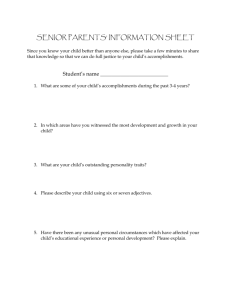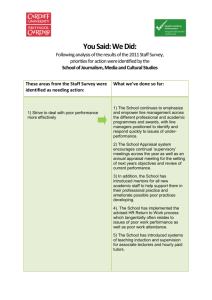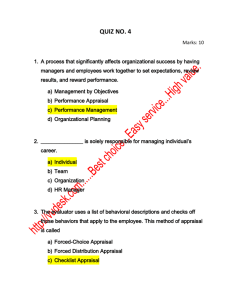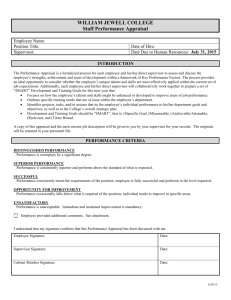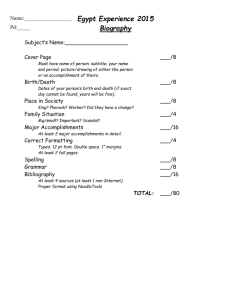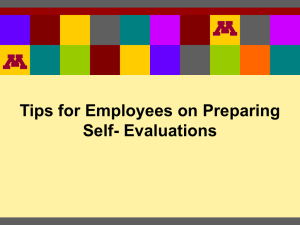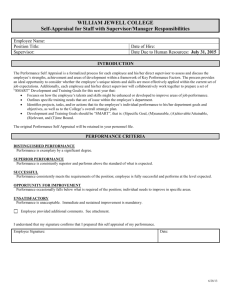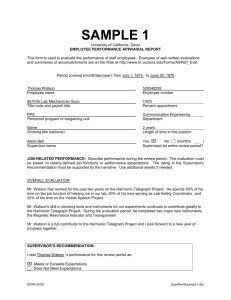SELF ASSESSMENT
advertisement
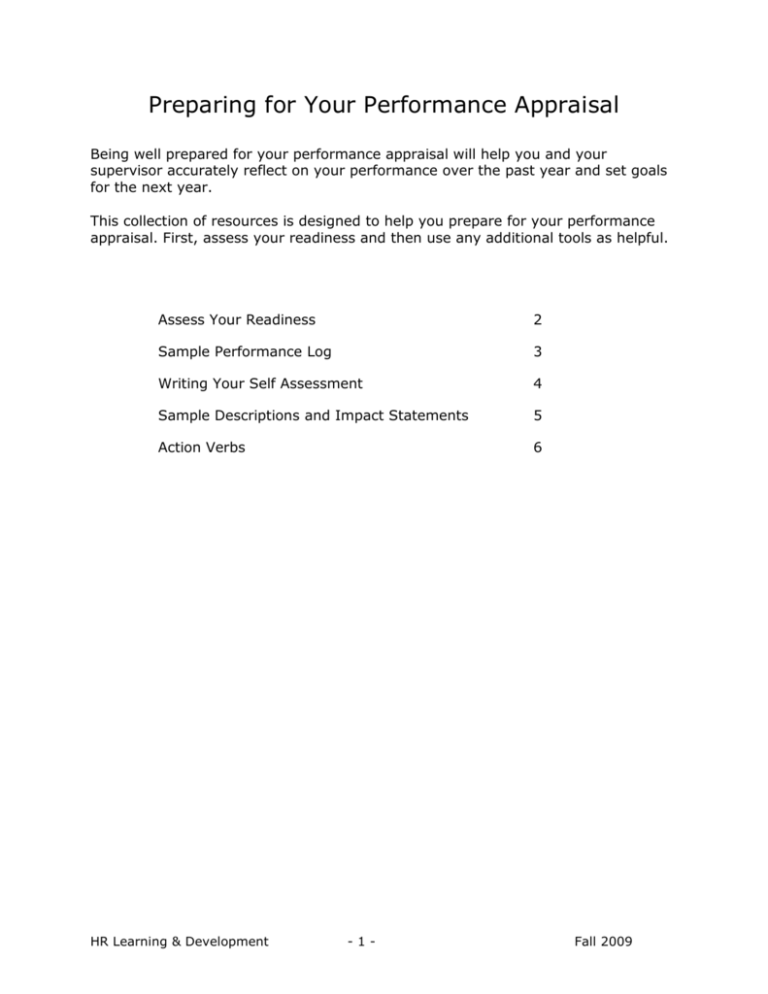
Preparing for Your Performance Appraisal Being well prepared for your performance appraisal will help you and your supervisor accurately reflect on your performance over the past year and set goals for the next year. This collection of resources is designed to help you prepare for your performance appraisal. First, assess your readiness and then use any additional tools as helpful. Assess Your Readiness 2 Sample Performance Log 3 Writing Your Self Assessment 4 Sample Descriptions and Impact Statements 5 Action Verbs 6 HR Learning & Development -1- Fall 2009 Assess Your Readiness The following statements describe actions you can take to ensure a productive and constructive performance appraisal process. While you don’t need to complete everything below for success, how many of these practices do you currently follow? YES NO I have a copy of my current job description and have reviewed it. I keep a performance log and update it frequently. (See sample on the next page.) I provide my supervisor with regular task and assignment updates. I meet with my supervisor formally at least once during each performance appraisal period. I know my manager and I share a common understanding of my key tasks, priorities and the purpose of my job. Before a performance appraisal, I complete a summary of accomplishments with specific examples. Before a performance appraisal, I review my job description and previous evaluations. I ask questions when I don’t understand or a task is unclear. I seek out informal feedback throughout the appraisal period. I know what I need from my supervisor to do a better job. I can articulate what I need to do to raise a specific performance rating. I follow up on areas of concern that come up during feedback sessions and appraisal discussions. I follow up on my development plan and seek out learning opportunities. HR Learning & Development -2- Fall 2009 Sample Performance Log Use a performance log to record your major milestones and work projects. Keeping track of your work over time will help you prepare for your performance evaluation and link your work to unit and organizational goals. If you don’t already track your performance, try it next year. Date Description HR Learning & Development Impact -3- Next Steps (if needed) Fall 2009 Writing Your Self Assessment What is a Self Assessment? A self assessment is an employee’s narrative description of accomplishments related to their job objectives. Purpose The purpose of an employee self assessment is to assist employees and supervisors in preparing for performance evaluations. Being asked to complete a self assessment invites you to be part of a discussion about your performance over the past year. Your self assessment can help you to reflect on your performance in the past year and to document your accomplishments and their impact on your unit. It is also an opportunity to communicate with your supervisor about your understanding of your job duties and responsibilities, performance standards and expectations, and your accomplishments. Preparation As you prepare to write your self assessment, begin by reviewing documentation about your work such as your job description, work objectives, and department goals and mission. If you keep a performance log to track major accomplishments and work throughout the year, review your log to help you reconstruct your performance over the past year. If not, take time to review your calendar and other records of your work. Reflect on the purpose of your job and how it contributes to the mission of your organizational unit. Writing Your Self Assessment Identify your work priorities over the past year based on your job description. For each priority, describe your work and accomplishments. Questions to address include: o What exactly was the work or task? o How is success measured? Possibilities include: impact, quantity, quality, accuracy, timeliness, budget, client satisfaction and a combination of these or other measures. o What was the impact of your work on your unit and the organization? o What obstacles did you have to overcome? Review your job description and work documents again to be sure you have addressed all of the items and priorities. Tips Be specific. Don’t say, “Supported the Thompson project.” Instead, indicate what you did specifically and how it supported the overall goals. Be objective and stay focused on results. While it is important to be thorough, a self assessment doesn’t have to be long to be effective. HR Learning & Development -4- Fall 2009 Sample Accomplishments and Impact Statement When reflecting on your accomplishments, describe the task, how you were successful, and the impact of this work. Description: Impact: Description: Impact: Designed and led training of divisional staff on efficiently and accurately preparing reports. Staff members were able to apply what they learned leading to more rapid and accurate reports for clients in direct support of our unit goal to improve customer service. Successfully hired, coached and mentored two employees who have recently passed probation. Employees are fully integrated into the organization and making contributions to achieving team goals. Description: Impact: Successfully led annual budget review for division management. Division managers were able to make significant financial decisions based on thorough analysis and to achieve cost savings based on recommendations. Description: Prepared and distributed four effective presentations for PIs and assistants on grant and award management. Improved relations with campus personnel and gave accurate procedural information to PIs thus reducing duplicative requests and errors in submissions. Impact: Description: Impact: After discussing best practices with the team, I simplified and redesigned the process for updating records and implemented this change. By reducing the time required to update records, our team accomplished this task in half the time that was required last year. HR Learning & Development -5- Fall 2009 Action Verbs Use these verbs to help describe your work. administered secured advised analyzed approved arranged built strengthened conceived conducted consolidated contracted controlled coordinated counseled created designed developed devised directed trained distributed edited eliminated engineered enhanced utilized examined executed expanded facilitated formulated generated governed grouped guided increased implemented HR Learning & Development improved upgraded indexed influenced initiated innovated installed solved invented investigated launched made managed maintained moderated monitored motivated negotiated organized -6- originated wrote performed planned prepared presented presided streamlined recommended recruited systematized rectified redesigned reduced reorganized reshaped restructured revised scheduled Fall 2009
